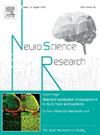海马沃伯格效应介导硫化氢改善糖尿病相关认知功能障碍:涉及促进海马突触可塑性。
IF 2.3
4区 医学
Q3 NEUROSCIENCES
引用次数: 0
摘要
我们以前的研究曾报道,硫化氢(H2S)具有改善糖尿病相关认知功能障碍(DACD)的能力,但其确切机制仍不清楚。最近的研究发现,沃伯格效应与突触可塑性有关,而突触可塑性在促进认知中起着关键作用。本研究旨在证明海马沃伯格效应是否有助于H2S改善DACD,并进一步探讨其潜在机制。我们发现 H2S 促进了 STZ 诱导的糖尿病大鼠海马的沃伯格效应并抑制了 OxPhos。H2S还能改善STZ诱导的糖尿病大鼠海马突触的可塑性,这可以从微结构的变化和不同关键酶的表达得到证明。此外,DCA 对海马沃伯格效应的抑制明显削弱了 H2S 对 STZ 诱导的糖尿病大鼠海马突触可塑性的改善作用。根据Y迷宫、新目标识别和莫里斯水迷宫测试,DCA阻断了H2S对STZ诱导的糖尿病大鼠认知功能障碍的改善。总之,这些研究结果表明,海马沃伯格效应通过改善海马突触可塑性介导了H2S改善的DACD。本文章由计算机程序翻译,如有差异,请以英文原文为准。
Hippocampal warburg effect mediates hydrogen sulfide-ameliorated diabetes-associated cognitive dysfunction: Involving promotion of hippocampal synaptic plasticity
Our previous studies have reported that hydrogen sulfide (H2S) has ability to improve diabetes-associated cognitive dysfunction (DACD), but the exact mechanisms remain unknown. Recent research reveals that Warburg effect is associated with synaptic plasticity which plays a key role in cognition promotion. Herein, the present study was aimed to demonstrate whether hippocampal Warburg effect contributes to H2S-ameliorated DACD and further explore its potential mechanism. We found that H2S promoted the hippocampal Warburg effect and inhibited the OxPhos in the hippocampus of STZ-induced diabetic rats. It also improved the hippocampal synaptic plasticity in STZ-induced diabetic rats, as evidenced by the change of microstructures and the expression of different key-enzymes. Furthermore, inhibited hippocampal Warburg effect induced by DCA markedly abolished the improvement of H2S on synaptic plasticity in the hippocampus of STZ-induced diabetic rats. DCA blocked H2S-attenuated the cognitive dysfunction in STZ-induced diabetic rats, according to the Y-maze, Novel Objective Recognition, and Morris Water Maze tests. Collectively, these findings indicated that the hippocampal Warburg effect mediates H2S-ameliorated DACD by improving hippocampal synaptic plasticity.
求助全文
通过发布文献求助,成功后即可免费获取论文全文。
去求助
来源期刊

Neuroscience Research
医学-神经科学
CiteScore
5.60
自引率
3.40%
发文量
136
审稿时长
28 days
期刊介绍:
The international journal publishing original full-length research articles, short communications, technical notes, and reviews on all aspects of neuroscience
Neuroscience Research is an international journal for high quality articles in all branches of neuroscience, from the molecular to the behavioral levels. The journal is published in collaboration with the Japan Neuroscience Society and is open to all contributors in the world.
 求助内容:
求助内容: 应助结果提醒方式:
应助结果提醒方式:


